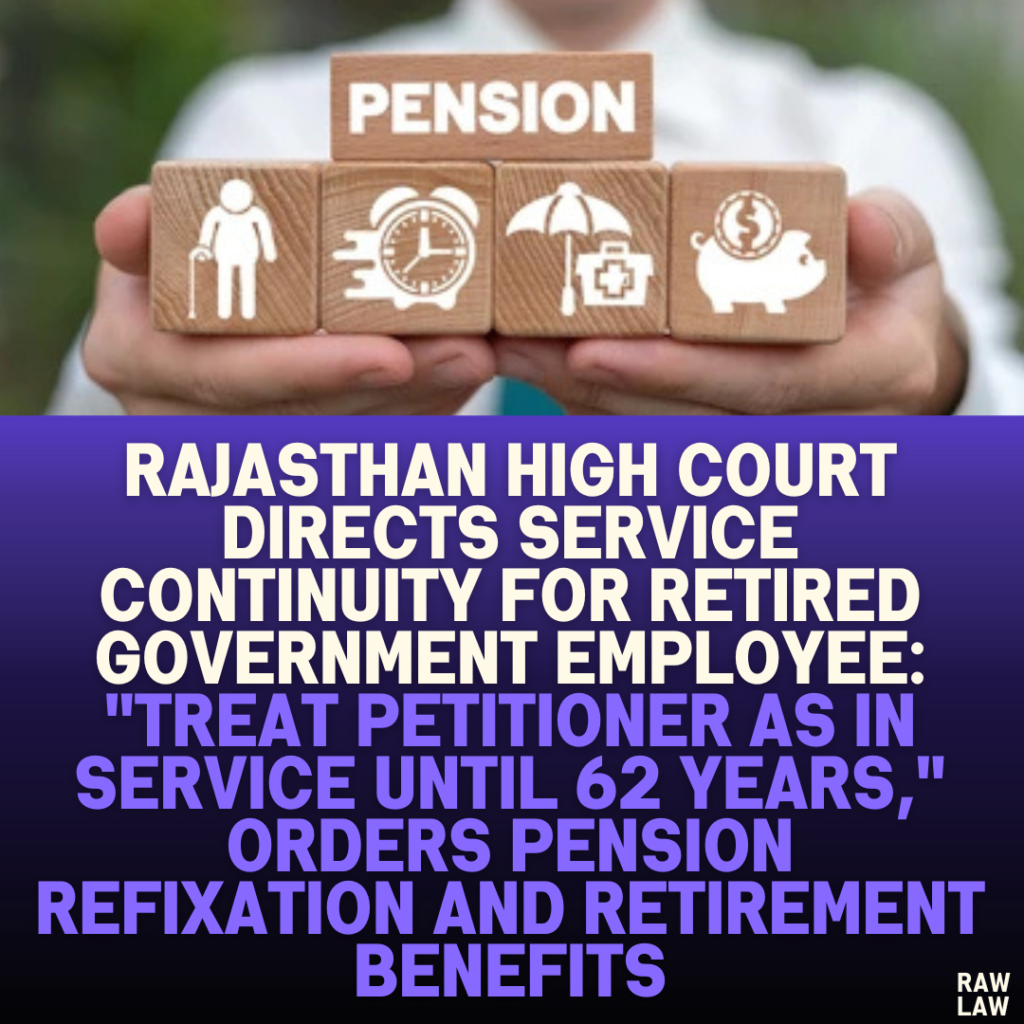Court’s Decision:
The Rajasthan High Court disposed of the writ petition by holding that the petitioner, who had retired and crossed the age of 62 years, is deemed to have continued in service up to the age of 62 years. It directed the respondents to:
- Treat the petitioner as in service until the age of 62 years.
- Pass necessary orders to ensure service continuity in individual cases.
- Undertake consequential actions such as refixation of pension and the granting of other retirement benefits.
The court’s decision was based on the precedent set in Dr. Mahesh Chandra Sharma & Ors. v. State of Rajasthan & Ors. and other connected cases, as well as the absence of any stay on those judgments by the Supreme Court.
Facts:
- Petitioner’s Background: The petitioner was a retired employee of the Ayurved and Bhartiya Chikitsa Vibhag under the Government of Rajasthan. The petitioner had reached the age of 62 years but had retired earlier and was now seeking recognition of service continuity up to the age of 62 years.
- Earlier Judicial Developments:
- The Rajasthan High Court, in a previous case (Dr. Mahesh Chandra Sharma & Ors.), ruled in favor of continuity of service up to the age of 62 years.
- The Supreme Court, in Pyare Lal Meena & Ors., clarified that no stay was imposed on the High Court’s earlier judgment favoring continuity of service.
- Current Petition: The petitioner relied on these judicial precedents to seek similar relief, arguing that continuity of service until 62 years was justified and warranted.
Issues:
- Is the petitioner entitled to continuity of service until 62 years based on prior judgments and legal principles?
- Should the respondents be directed to refix the petitioner’s pension and grant consequential benefits in light of deemed service continuity?
Petitioner’s Arguments:
The petitioner’s counsel made the following submissions:
- The Supreme Court in Pyare Lal Meena & Ors. clarified that the High Court’s earlier judgment was not stayed and must be implemented.
- The petitioner’s case was similar to the one in Dr. Mahesh Chandra Sharma & Ors., where employees were deemed to have continued in service until the age of 62 years.
- The petitioner’s retirement benefits, including pension, needed refixation to reflect service continuity.
Respondent’s Arguments:
The respondents contended that:
- Any directions by the court should align with existing precedents and Supreme Court orders.
- They were willing to abide by the court’s judgment provided it was consistent with previous rulings.
Analysis of the Law:
- Judicial Precedents:
- Dr. Mahesh Chandra Sharma & Ors.: The High Court previously ruled that employees must be deemed to have continued in service until the age of 62 years, and corresponding benefits should follow.
- Pyare Lal Meena & Ors.: The Supreme Court clarified that there was no stay on the High Court’s judgment, ensuring that earlier decisions favoring employees remained valid.
- Legislative Framework:
- The petitioner’s claim was evaluated within the context of service and pension rules, requiring compliance with judgments ensuring continuity of service for government employees.
- Principles of Justice and Equality:
- The court emphasized equitable treatment for similarly placed employees, ensuring that the petitioner received the same benefits as granted in previous cases.
Precedent Analysis:
- Relevance of Dr. Mahesh Chandra Sharma & Ors. Case:
- The court found the present case aligned with the facts and issues addressed in Dr. Mahesh Chandra Sharma & Ors., where the High Court directed service continuity and related benefits.
- Supreme Court Clarifications in Pyare Lal Meena & Ors. Case:
- The Supreme Court’s order reinforced the binding nature of the High Court’s judgment, confirming no legal impediment to implementing service continuity.
Court’s Reasoning:
The court relied on the following key observations:
- Continuity of Service:
- The petitioner, like employees in prior cases, is entitled to continuity of service up to the age of 62 years, given the absence of any stay on the High Court’s earlier rulings.
- Consequential Benefits:
- Service continuity necessitates appropriate adjustments, including pension refixation and granting of retirement benefits. The court stressed that these benefits were not discretionary but a legal obligation arising from deemed service continuity.
- Applicability of Precedent:
- The court deemed the principles laid down in Dr. Mahesh Chandra Sharma & Ors. as directly applicable to the petitioner’s case.
Conclusion:
The court directed the respondents to:
- Treat the petitioner as having continued in service until the age of 62 years.
- Pass orders ensuring service continuity with all consequential benefits, including pension refixation.
- Implement the directives within the framework of previous judgments, particularly Dr. Mahesh Chandra Sharma & Ors..
Implications:
- Reaffirmation of Legal Precedents:
- The judgment underscores the binding nature of precedents and clarifies that government employees are entitled to continuity of service under similar circumstances.
- Administrative Compliance:
- The ruling obligates administrative authorities to ensure timely implementation of court orders and avoid delays in providing retirement benefits.
- Equitable Treatment:
- The decision highlights the importance of consistency in judicial outcomes, ensuring fairness and equality for all similarly placed employees.




Pingback: Delhi High Court Invalidates Exemptions to Equestrian Federation of India, Citing Arbitrariness and Violation of Sports Code Principles; Orders Investigation to Reform Governance - Raw Law